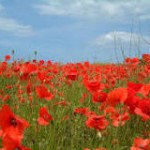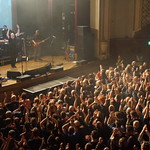 Last year I didn’t wear a Remembrance Poppy. I felt that the symbol was losing its meaning as memorial to the dead in the two World Wars, and had been taken over by jingoistic militarists, especially the racists of the far-right.
Last year I didn’t wear a Remembrance Poppy. I felt that the symbol was losing its meaning as memorial to the dead in the two World Wars, and had been taken over by jingoistic militarists, especially the racists of the far-right.
This year was different.
Back in September I went to see Fish play at the Arts Centre in Pontardawe in South Wales, on the tour promoting his new album. The centrepiece of that record is a twenty-minute song cycle entitled “The High Wood Suite”, inspired by the World War One Battle of the Somme in which both his grandfathers fought.
Fish gave a long introduction telling the inspiration behind it; his grandfather in the entrenchment division digging trenches through ground filled with the bodies torn apart by shellfire. He told the story of the Lad’s Battalions, drawn from small communities just like Pontardawe, who fought and died together, entire communities sometimes wiped out in a morning.
There was nothing heroic about this. No noble self-sacrifice for a justified cause. This, as Fish made abundantly clear, was mass murder on an industrial scale. Read this angry piece by Charlie Stross – World War One killed five percent of Britain’s adult male population, and crippled another ten percent. And French casualties were even higher.
This is what we must never forget.
I remember spending several minutes after the show staring at the war memorial right outside the venue, looking at the list of names.
I saw Fish again on the 6th of November on the final night of the tour. There were a great many poppies worn in the audience. I’lll let him have the final word: these lyrics are the closing verses of “The Leaving”, the sombre final song from The High Wood Suite.
It had to end, the armies broken
One side had lost but who had won
The ravaged land, the decimation
So hard to bear, the loss and painThe men returned, the war was over
The bells rang out, a country cheered
Behind their eyes they stored the horrors
Behind their smiles they hid their fearsThe medals and the honours were handed out
to those who served
The letters of condolences were kept
Reminding generations of the sacrifices made
The suffering and the torment
of the men most never knew,Lest we forget
– Derek W Dick, 2013


I’ve not worn a poppy for ages. I hate how, in a media age, Rememberance Day is now much more about ‘being seen to be doing something for it’ than actually remembering those who have given their lives in war. TV Presenters and Politicians suddenly all start wearing them weeks before the actual day and, for me, this takes away from the spirit of the day. It always seems like a cynical acts to further their own reputation. I agree about Fish’s songs though. They are truely excellent are one of the few things about rememberance/WWI that I feel is genuine.
I’ve always worn a poppy on Remembrance Sunday. I was a child during WWII and was well aware of what was being reported, although none of my close relatives served in the forces (too old or too young). I vividly remember D Day seeing thousands of aircraft overhead (with the special D Day insignia). A bit later we had a brief holiday in Weymouth, filled with American troops, waiting to be sent to their deaths in France. (The doughnuts they gave out from their portable oven on the sea front were delicious.) I was then also reading books that one of my uncles had as a boy in the 1920s about the experiences of two boys serving as a midshipman (at the Battle of Jutland) and as a motor scout (on the Flanders battlefield). They were good adventure stories, and not particularly vainglorious.
The way Remembrance has changed in recent years, with the realization that there are new wars to chill us with deaths of young men and women, is typified by the televised Festival of Remembrance at the Royal Albert Hall. It used to include lots of items glorifying the power and ingenuity of modern war-making. Last Saturday there was none of that. Pop songs and reminders of recent deaths as well as WW ones, plus some military bands filled the schedule.
“One side had lost, but who had won? ….. The men returned ….they stored the horrors”. Fish’s song by Derek W Dick, say it all really.
My grandfather fought in WWI and was in the Home Guard for WWII.
I can see on our family tree how many relatives failed to return from WWII, and some who did were not the same men who went away – or so their wives said.
Yet for all our attempts to remember just how awful war is, I seem to recall that the UK armed forces have had casualties during armed conflict every year but one since 1945.
We will remember them.
I remember reading (can’t remember where now), that major wars only happen when people have forgotten how horrible the previous one was.
Another reason we should never forget.
WW2 was the exception to this, which lends credence to the idea that the two World Wars were really a single war with a 20-year ceasefire in the middle.